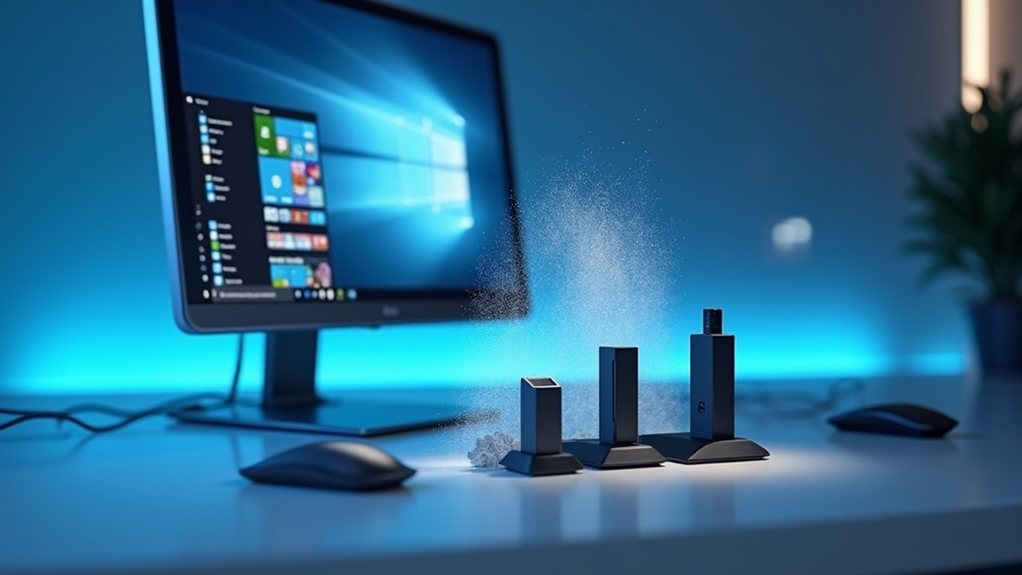Windows 11’s latest cleanup strategy targets bloatware heavyweights Copilot, Outlook, and Teams, offering users significant storage and performance benefits. Microsoft’s built-in tools, including an improved Disk Cleanup utility and Storage Sense, provide powerful options for removing resource-intensive components. As the standard cleanup tools handle basic maintenance, advanced users can leverage PC Manager beta or third-party alternatives for more thorough system optimization. The real magic happens when you start digging into the specialized removal techniques.

As Windows 11 brings a sleek design and improved features to users worldwide, its storage management needs can quickly become overwhelming without proper cleanup practices. Microsoft has responded to this challenge by offering multiple built-in cleanup tools, with a particular focus on removing resource-heavy components like the Copilot AI assistant, Outlook desktop bloat, and Teams installations that can slow down system performance.
The native Disk Cleanup utility remains a powerhouse for basic file maintenance, accessible through a quick Start menu search. When run with administrator privileges, it reveals additional system file cleanup options that can recover substantial storage space. For maximum effectiveness, users should click the Cleanup system files button to access enhanced deletion capabilities. Users can also access the Windows Store Apps troubleshooter to resolve full Temp folder issues that commonly arise.
Nevertheless, users should exercise caution around Patch Tuesday, as removing Windows update files eliminates the ability to roll back to previous versions.
Schedule your system cleanup wisely – deleting Windows update files near Patch Tuesday prevents you from reverting problematic updates.
Storage Sense and Cleanup Recommendations, found in Windows 11’s Settings menu, take a more sophisticated approach to storage management. This intelligent tool analyses temporary files, large unused content, and system files, offering a thorough overview of what’s consuming precious drive space.
It even includes the ability to compress the OS drive – a clever way to increase available storage without sacrificing files.
Microsoft’s latest addition to the cleanup arsenal, PC Manager, promises to transform system maintenance with its all-in-one approach. Currently in beta, this free tool combines storage management, performance optimisation, and threat scanning capabilities.
Think of it as a digital Marie Kondo for your PC, helping users decide which files spark joy and which are just digital clutter.
The battle against bloatware has never been more strategic. Modern Windows 11 cleanup tools particularly target pre-installed components that tend to accumulate digital detritus over time.
Outlook’s cached data and offline files can balloon to surprising sizes, while Teams’ background processes can quietly consume system resources like a stealthy RAM burglar.
Despite the impressive array of official tools, distribution challenges with Microsoft PC Manager have led many users to explore third-party alternatives. Tools like PC Cleaner for Windows have stepped up to fill the gap, offering specialised features for managing duplicate files and optimising system performance without the uncertainty of beta software availability.
The results of these cleanup efforts can be dramatic – users often recover several gigabytes of storage space while enjoying noticeably improved system responsiveness.
Nevertheless, it’s worth noting that aggressive cleanup comes with trade-offs. Though compression techniques can boost available space without affecting file access, removing certain system files might limit recovery options.
The key lies in striking the right balance between thorough cleaning and maintaining vital system functionality.
Final Thoughts
Microsoft’s latest Windows 11 cleanup tools address the issue of bloatware by allowing users to remove pre-installed apps like Copilot, Teams, and Outlook, thereby optimizing system resources and addressing user concerns about unwanted software. Ipswich Computer Repairs is here to assist you in navigating these changes and ensuring your system runs smoothly. For more information or to get started, click on our contact us page to reach out today!

